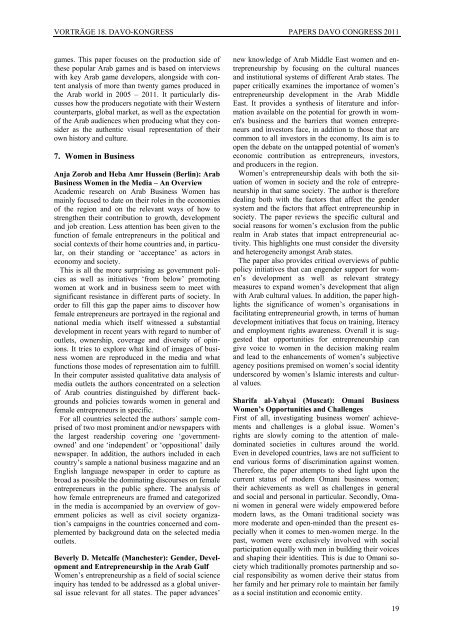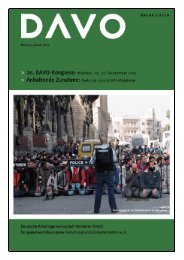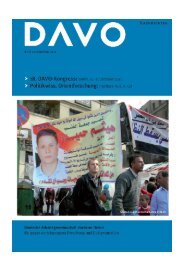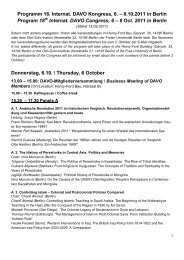4 Dissertationen und Habilita- tionen / Dissertations and Habilitations
4 Dissertationen und Habilita- tionen / Dissertations and Habilitations
4 Dissertationen und Habilita- tionen / Dissertations and Habilitations
Sie wollen auch ein ePaper? Erhöhen Sie die Reichweite Ihrer Titel.
YUMPU macht aus Druck-PDFs automatisch weboptimierte ePaper, die Google liebt.
VORTRÄGE 18. DAVO-KONGRESS PAPERS DAVO CONGRESS 2011<br />
games. This paper focuses on the production side of<br />
these popular Arab games <strong>and</strong> is based on interviews<br />
with key Arab game developers, alongside with content<br />
analysis of more than twenty games produced in<br />
the Arab world in 2005 – 2011. It particularly discusses<br />
how the producers negotiate with their Western<br />
counterparts, global market, as well as the expectation<br />
of the Arab audiences when producing what they consider<br />
as the authentic visual representation of their<br />
own history <strong>and</strong> culture.<br />
7. Women in Business<br />
Anja Zorob <strong>and</strong> Heba Amr Hussein (Berlin): Arab<br />
Business Women in the Media – An Overview<br />
Academic research on Arab Business Women has<br />
mainly focused to date on their roles in the economies<br />
of the region <strong>and</strong> on the relevant ways of how to<br />
strengthen their contribution to growth, development<br />
<strong>and</strong> job creation. Less attention has been given to the<br />
function of female entrepreneurs in the political <strong>and</strong><br />
social contexts of their home countries <strong>and</strong>, in particular,<br />
on their st<strong>and</strong>ing or ‘acceptance’ as actors in<br />
economy <strong>and</strong> society.<br />
This is all the more surprising as government policies<br />
as well as initiatives ‘from below’ promoting<br />
women at work <strong>and</strong> in business seem to meet with<br />
significant resistance in different parts of society. In<br />
order to fill this gap the paper aims to discover how<br />
female entrepreneurs are portrayed in the regional <strong>and</strong><br />
national media which itself witnessed a substantial<br />
development in recent years with regard to number of<br />
outlets, ownership, coverage <strong>and</strong> diversity of opinions.<br />
It tries to explore what kind of images of business<br />
women are reproduced in the media <strong>and</strong> what<br />
functions those modes of representation aim to fulfill.<br />
In their computer assisted qualitative data analysis of<br />
media outlets the authors concentrated on a selection<br />
of Arab countries distinguished by different backgro<strong>und</strong>s<br />
<strong>and</strong> policies towards women in general <strong>and</strong><br />
female entrepreneurs in specific.<br />
For all countries selected the authors´ sample comprised<br />
of two most prominent <strong>and</strong>/or newspapers with<br />
the largest readership covering one ‘governmentowned’<br />
<strong>and</strong> one ‘independent’ or ‘oppositional’ daily<br />
newspaper. In addition, the authors included in each<br />
country’s sample a national business magazine <strong>and</strong> an<br />
English language newspaper in order to capture as<br />
broad as possible the dominating discourses on female<br />
entrepreneurs in the public sphere. The analysis of<br />
how female entrepreneurs are framed <strong>and</strong> categorized<br />
in the media is accompanied by an overview of government<br />
policies as well as civil society organization’s<br />
campaigns in the countries concerned <strong>and</strong> complemented<br />
by backgro<strong>und</strong> data on the selected media<br />
outlets.<br />
Beverly D. Metcalfe (Manchester): Gender, Development<br />
<strong>and</strong> Entrepreneurship in the Arab Gulf<br />
Women’s entrepreneurship as a field of social science<br />
inquiry has tended to be addressed as a global universal<br />
issue relevant for all states. The paper advances’<br />
new knowledge of Arab Middle East women <strong>and</strong> entrepreneurship<br />
by focusing on the cultural nuances<br />
<strong>and</strong> institutional systems of different Arab states. The<br />
paper critically examines the importance of women’s<br />
entrepreneurship development in the Arab Middle<br />
East. It provides a synthesis of literature <strong>and</strong> information<br />
available on the potential for growth in women's<br />
business <strong>and</strong> the barriers that women entrepreneurs<br />
<strong>and</strong> investors face, in addition to those that are<br />
common to all investors in the economy. Its aim is to<br />
open the debate on the untapped potential of women's<br />
economic contribution as entrepreneurs, investors,<br />
<strong>and</strong> producers in the region.<br />
Women’s entrepreneurship deals with both the situation<br />
of women in society <strong>and</strong> the role of entrepreneurship<br />
in that same society. The author is therefore<br />
dealing both with the factors that affect the gender<br />
system <strong>and</strong> the factors that affect entrepreneurship in<br />
society. The paper reviews the specific cultural <strong>and</strong><br />
social reasons for women’s exclusion from the public<br />
realm in Arab states that impact entrepreneurial activity.<br />
This highlights one must consider the diversity<br />
<strong>and</strong> heterogeneity amongst Arab states.<br />
The paper also provides critical overviews of public<br />
policy initiatives that can engender support for women’s<br />
development as well as relevant strategy<br />
measures to exp<strong>and</strong> women’s development that align<br />
with Arab cultural values. In addition, the paper highlights<br />
the significance of women’s organisations in<br />
facilitating entrepreneurial growth, in terms of human<br />
development initiatives that focus on training, literacy<br />
<strong>and</strong> employment rights awareness. Overall it is suggested<br />
that opportunities for entrepreneurship can<br />
give voice to women in the decision making realm<br />
<strong>and</strong> lead to the enhancements of women’s subjective<br />
agency positions premised on women’s social identity<br />
<strong>und</strong>erscored by women’s Islamic interests <strong>and</strong> cultural<br />
values.<br />
Sharifa al-Yahyai (Muscat): Omani Business<br />
Women’s Opportunities <strong>and</strong> Challenges<br />
First of all, investigating business women' achievements<br />
<strong>and</strong> challenges is a global issue. Women’s<br />
rights are slowly coming to the attention of maledominated<br />
societies in cultures aro<strong>und</strong> the world.<br />
Even in developed countries, laws are not sufficient to<br />
end various forms of discrimination against women.<br />
Therefore, the paper attempts to shed light upon the<br />
current status of modern Omani business women;<br />
their achievements as well as challenges in general<br />
<strong>and</strong> social <strong>and</strong> personal in particular. Secondly, Omani<br />
women in general were widely empowered before<br />
modern laws, as the Omani traditional society was<br />
more moderate <strong>and</strong> open-minded than the present especially<br />
when it comes to men-women merge. In the<br />
past, women were exclusively involved with social<br />
participation equally with men in building their voices<br />
<strong>and</strong> shaping their identities. This is due to Omani society<br />
which traditionally promotes partnership <strong>and</strong> social<br />
responsibility as women derive their status from<br />
her family <strong>and</strong> her primary role to maintain her family<br />
as a social institution <strong>and</strong> economic entity.<br />
19





